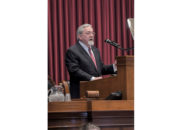Javier Alatorre, one of the suspects in a mass shooting at a Kansas City, Kansas, bar over the weekend, has a history of run-ins with the law in Missouri. Just last month, he was before a judge in Jackson County who — despite a prosecutor’s warnings — granted the 23-year-old’s bond reduction request and released him on his own recognizance.
A month later, police say Alatorre is one of two men who walked into Tequila KC early Sunday morning and opened fire, killing four people and wounding five others.
In the wake of the shooting, some Republican lawmakers across the border are questioning the new bond rules set by the Missouri Supreme Court that went into effect in July. Those rules urged judges to consider non-monetary conditions of release first, unless deemed necessary for the public’s safety or to ensure an alleged offender will show up to a scheduled court appearance.
Republican state Rep. Justin Hill said judges’ decision to change the rules left him “furious” and he plans to file a bill in the upcoming legislative session to undo those changes.
“The court went around the welfare of the people of Missouri — and in this case some of the people of Kansas — they disregarded the welfare of the public to give this suspect the benefit of the doubt because of a monetary situation he or she may be in,” Hill told The Missouri Times. “It’s so offensive.”

As for Alatorre, Jackson County assistant prosecuting attorney Stephanie R. Sang attempted to block a bond reduction. She argued Alatorre posed a flight risk with a habit of skipping court appearances and fleeing from police. Additionally, Sang said Alatorre was a danger to the public.
He has a history of arrests in Missouri over the years, according to court records, from alleged possession of a controlled substance to resisting arrest to alleged traffic violations.
But still, Circuit Court Judge Kevin D. Harrell’s Sept. 9 order ignored the prosecutor’s warnings and allowed for Alatorre to be released on his own recognizance. He ordered Alatorre to submit to certain conditions, including random drug testing.
Hill, a former O’Fallon Police officer, said if changes to the rules aren’t made, “absolutely” a similar situation could occur in Missouri.
“It is naive at best and surely dangerous to release a perpetrator, expecting them to show up on the court date, because we ‘nicely’ ask them to be there,” GOP Rep. Jeff Shawan, who wrote a letter to the Supreme Court in opposition to the rule changes earlier this year, told The Missouri Times. “Furthermore, it is a danger to the public and peace officers to expect those who have been habitually arrested for violent crimes to behave lawfully upon release.”
“The case of Mr. Alatorre is an example of this very problem, and there will be more tragedy to come, in my opinion. Something must be done,” Shawan said.
And Rep. Dottie Bailey said the rules “have gone too far.” A Republican from Eureka, she placed blame on the judge for letting Alatorre go despite his history.
“We can’t just stop holding people for bond and have this happen,” she told The Missouri Times. “That the judges aren’t catching more fire for this is a little irritating. I’ve talked to some other representatives, and we’re going to look at this very closely. If there is so much gray in there, and we’re just going to let these accused felons go, it’s not safe at all. It’s just not right when this could have been stopped.”
But Rep. Steve Roberts, a Democrat who represents parts of St. Louis, isn’t so confident stronger pre-trial bail rules are a solution, drawing on his own experiences as a former prosecutor.
“The system is already heavy and has been harsh in terms of keeping people confined before their trial date when they don’t need to be,” Roberts told The Missouri Times. “There are already appropriate mechanisms in place if someone is a threat to a victim, a danger to society. If the state was able to approve they’re unlikely to return back to the court for their court date, they have the tools to keep them confined.”
“In my experience as a lawmaker, a former prosecutor … our crime problem is not something we can arrest our way out of,” Roberts said.
Alatorre was arrested on Sunday with bail set at $1 million. He and Hugo Villanueva-Morales, who remains at large, have been charged with four counts of first-degree murder.

Kaitlyn Schallhorn was the editor in chief of The Missouri Times from 2020-2022. She joined the newspaper in early 2019 after working as a reporter for Fox News in New York City.
Throughout her career, Kaitlyn has covered political campaigns across the U.S., including the 2016 presidential election, and humanitarian aid efforts in Africa and the Middle East.
She is a native of Missouri who studied journalism at Winthrop University in South Carolina. She is also an alumna of the National Journalism Center in Washington, D.C.
Contact Kaitlyn at kaitlyn@themissouritimes.com.
































